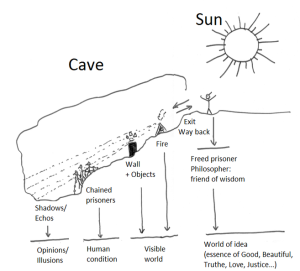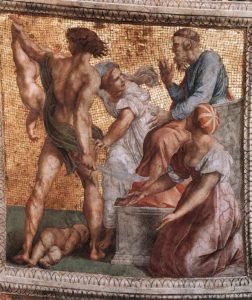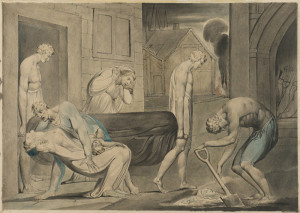
Plato’s Cave Elegantly Depicted Illusion
His Error: Man Can Escape the Cave Alone
Plato wrote his work, Republic, approximately 520 B.C. in which he described The Cave. People are regulated to look only at the back wall and the shadows being cast there. This formed their reality; however, the shadows were being cast by people behind them. Thus, their reality was actually illusion propagated by others. Somehow one can release one’s self and start the journey toward the mouth of the cave and true reality; coming into the sunlight. This is a classic work’s based salvation that Paul condemns because one cannot save one’s self (Jo 6:44; Ro 4:13-14).
As concise and elegant as Plato wrote his analogy, he did not explain how anyone could escape their bondage and move up the cave and into the light. The people casting the illusions would most certainly seek to prevent anyone from escaping and thus expose their illusions. They would lose control which is the point of casting the illusions. Remember, it is always about control. But, Plato was not the first to actually write about the illusion of life; there was another who wrote in a blunter fashion.

King Solomon Was Supposedly Wise
Yet, He Wasted Most of His Life Foolishly
Solomon (1010-930 B.C. approximately) was announced by David as his successor to Israel’s throne (1Ki 1). Solomon loved God. The Lord appeared to Solomon at Gibeon after Solomon sacrificed to God. God asked Solomon what God could do for him and Solomon asked for wisdom. Because Solomon did not ask for long life or riches, God granted him wisdom (1Ki 3:3-12). The above graphic illustrates his wisdom to discern the truth (1Ki 3:16-28). However, Solomon did not ask for nor receive spiritual wisdom; rather, he asked for wisdom to rule or political wisdom, He married many foreign wives, forbidden by the Law, built them centers of worship and sacrificed to their idols (1Ki 11). It was during this period that Solomon wrote Ecclesiastes under the pseudonym of The Convener {Collector} of Jerusalem (Ec 1:1). Most English translations stick to the title of Preacher which makes little sense in both the Hebrew and today’s usage. Solomon was a collector of things, people and writings in his search for everlasting wisdom; in the end, he was a convener of his own words in which he decries the futility of collecting writings (Ec 12:12). From the very beginning of this book The Convener cries out, “Vanity of vanities…! All is vanity” (Ec 1:2).

To Solomon Death was the Great Equalizer
Death Unmasked the Illusion of One’s Life
Vanity is the English translation for the Hebrew word hebel {הֶבֶל}. Bible readers are familiar with this word as a name, Abel (Ge 4:2). Hebel means vapor or breath carrying the connotation of weakness or worthlessness. Thus, Abel was the worthless one compared to Cain, given of God, who was being raised as the warrior to defeat Satan who duped Woman to sin (Ge 3:1-7; 1Ti 2:13-14). Solomon was actually saying that all life is ephemeral, lasting but a moment then passing away into nothingness like one’s breath on a cold day. The use of hebel is also significant in that one has life while one has breath; the moment that breathing stops, life stops. This is the wondrous intricacy of Hebrew that is missed because most Christians do not read the Old Testament much or do not take the time to look behind their vernacular language to understand even the definitions of the original languages. They remained trapped in their illusion of knowledge that may in fact be in precise if not incorrect; but, I digress.
Solomon, for all his wives, riches, power and fame, knew he would die (Ec 1:11; 6:1-6; Ja 1:9-11). During his life he observed that everything is cyclic which to him was pointlessness; or as we would say today, nihilistic. His wisdom only concluded life was pointless for the rich and the poor. The rich cannot take their riches with them, making them like the poor. Death was the great equalizer; a fact not lost on Job either who lived much earlier (Job 14:1-14). The illusion of life persisted despite hedonism, philosophic musings, great works of labor {architecture} and even honor. Solomon lamented that no matter how much good an individual may perform; evil not only persists but grows in violence that only death eases. Basically, Solomon identifies the futility of life when only death waits at the end. This is the view of the natural person (1Co 2:14).
Solomon’s collected experiences were but a breath vanishing in a moment. When viewed from this side of death his natural observations are quite correct. Whereas Plato envisioned hope for some to escape the illusion of the cave; Solomon only saw death looming ever closer for everyone without exception. For him there was no hope within himself since he could not conquer death but must in fact be overcome by death. This is the fallacy of all man’s philosophic musings and religious works. At the end everyone becomes the same: dead. And, along the way everyone lives within the illusions of their worldview that each will be different, each will find the secret and conquer death. Yet, each dies gasping for the next hebel, breath, until the body fails. Who then cares about politics, philosophy, or possessions? As Solomon said, “This also is a hebel and a striving after ruah, wind {spirit}”. Yet, this is also the answer that makes the hope offered by the Bible different.
Christ told Nicodemus that there are two types of people: those born of the flesh who remain in the flesh and those born of ruah or Spirit (Jo 3:6-8). The natural man born of the flesh {lost} does not understand the birth of the Spirit. It is like a wind that comes and goes mysteriously. It makes no sense to the natural person until one is born from above {a more correct translation of the Greek ἄνωθεν, anōthen} (Jo 3:3). After Adam {Hebrew for man} sinned, all were born in sin. Man then set about to construct his own reality via government and religion beginning with Cain (Ge 4:17). Having rejected the truth of God, man’s only alternative was to construct his own reality, an illusion (Ro 1:18-25). Yet, death removes this illusion confronting the person with absolute reality (Lk 16:19-31). This reality only becomes worse when Hell is moved into the Lake of Fire after the White Throne Judgment (Re 20:11-15). The fiery Seraphim will spend eternity searching each soul for a spark of God’s righteousness to release that soul; and find none. In that place there is no great, small, white, black, American, Chinese for all are equal. Each soul there wanted to live an eternity without God and they will have that wish fulfilled.
For those natural people whom God saved down through the years death will be rather different (Ep 1:3-10). Death has lost its victory and sting in the death of the sinless Christ for sinners such as I; yet, for the natural ones who loved their illusions their sting of death is sin as confirmed by their self-made, self-righteous laws and philosophies (1Co 15:55-56). Whereas Nietzsche saw nihilism as liberating man from God’s absolute morality to develop his own true reality; nihilism is simply the rejecting of God’s absolute truth for man’s illusions, illusions that will be revealed at death.
Whereas Plato imagined the light of man’s reason as the force liberating man from illusion; that was simply a substitution of one illusion for another. Solomon arrived at the only viable solution open to man: Reverence God who will bring every deed, secret or not, into judgment (Ec 12:13-14). Christ satisfied the Law for us by becoming a curse under the law {sin} for us so that we may be saved through His deed (Ga 3:13-14). While the Lost have no hope except that saved them as us, the Saved are to strive in understanding though while alive we see as through an enigma until the time we shed these bodies of flesh (1Co 13:12). This is why we are to learn and practice discernment; so that we can pierce through the illusions of life, layer by layer knowing true good from hopeless evil (He 5:12-14).
